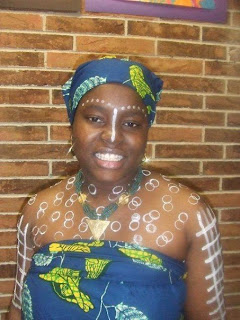

There’s a company, Berlin Investments Limited, that manufacturers and distributes a line of cosmetics named Black's Secret Make-up products in Ghana. It started selling its products and has grown in popularity so the management decided to expand. This led to the decision to open up a make-up bar in Osu, a high-time shopping area in Accra, the capital of Ghana. Ghana’s economy is growing pretty steady right now and one sector that is seeing exponential growth is the movie/music/entertainment industry. Its becoming more and more westernized with celebrities creating their own Ghanaian hybrid pop culture so this really doesn’t come as a shock to me. Women will feel like they should look like what they see on tv and in the movies (just like they do here in the United States) so they’ll want to get all the works done to make it happen. What interests me is the reactions to this article on the Ghanaweb.com website.
The men don’t want it!!! The guys that commented on the article are so appalled at the fact that the make-up line offers sun screen and melanin protection that they just had to scream out.
And I must confess that I’m enjoying reading the comments. Why? Because traditionally Ghanaians (or should I Africans in general) don’t wear make-up. Its not a part of our culture. What we would put on our faces to beautify ourselves looks nothing like what L’oreal and CoverGirl put on the shelves. (An example can be seen in this picture of myself dressed in traditional wear for a performance at an African cultural show.)
When a woman puts on foundation, blush, mascara and lipstick, they’re seen as being artificial and fake. I know many men that totally look down on it including my own father. One person commented that “they are destroying our women.” That is really how someone feels. Another person commented that “My beautiful Black Woman is natural ... No makeup.”
Interestingly enough a day after reading this article I came across another one that talked about African women and their hair.
In this article a guy talks about his mom and how he never really saw her real hair ever because she always wore wigs. To him he had no clue why she did that thinks she would look just fine with her natural regular hair. Meaning her nappy bushy unpermed hair. (See exhibit two…. My hair). He brought this up after seeing the film/documentary by Chris Rock called Good Hair. Please go see it if you haven’t. Its extremely informative and hilarious at the same time. It will show you what black women really go through to look the way they look and how much it costs them (both financially and health-wise). So he says girls shouldn’t throw chemicals in their hair and make themselves sick in the name of having their hair straight and just leave it the way it is. Then he asks other guys to comment on what they think of his opinion. He got 88 comments and I might be adding one myself. After all, what makes you beautiful is what is on the inside, not the outside.
